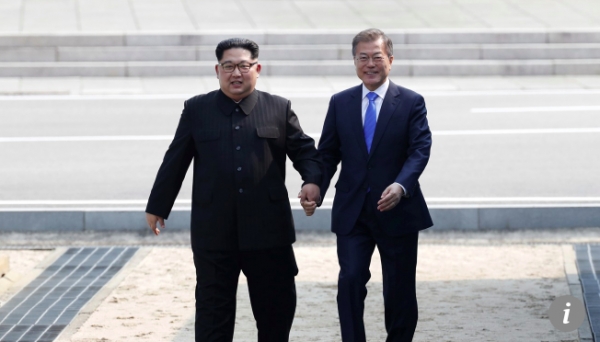Kim Jong-un has become the first North Korean leader to set foot in South Korea by crossing the military line that has divided the peninsula since the end of the Korean War in 1953.
In a moment rich with symbolism and pomp, South Korean leader Moon Jae-in and Mr Kim shook hands at the border.
Kim said he hoped for "frank" discussion in a warm opening exchange.
Just months ago North Korean rhetoric was warlike, but now they may discuss a peace treaty and nuclear weapons.
Much of what the summit will focus on has been agreed in advance, but many analysts remain deeply sceptical about the North's apparent enthusiasm for engagement.
An unscripted moment
The whole of South Korea stood still for the moment the leaders shook hands on both sides of the border in the demilitarised zone that divides the countries.
Then audiences watched in surprise as Mr Kim invited the South Korean president to step briefly across the demarcation line into North Korea, before the pair stepped back into South Korea - all the while holding hands.
It was an apparently unscripted moment during a highly choreographed sequence of events.
The first session has broken up and the pair will have lunch separately. Kim returned to the North in a heavily guarded black limousine for lunch. He will cross back over the border in the afternoon to resume discussions.
A new history' begins
The leaders were met by an honour guard in traditional costume on the South Korean side. The pair then walked to the Peace House in Panmunjom, a military compound in the demilitarised zone (DMZ) between the two countries.
"A new history begins now - at the starting point of history and the era of peace," read the message Kim wrote in a guestbook.
The gravity of the meeting - the first between Korean leaders in more than a decade - was also punctuated by lighter moments. Kim joked about bringing some of North Korea's famous cold noodles for the summit.
"I hope you will really enjoy the noodles that we brought," he said.
The White House said it was hopeful talks would make progress toward peace and prosperity. The Korean summit is seen as a prelude to a proposed meeting between Kim and US President Trump, an unprecedented move as no sitting US president has met with a North Korean leader.
The focus of talks
Talks will address North Korea's controversial nuclear weapons programme.
Seoul has warned that reaching an agreement to rid Pyongyang of its nuclear weapons will be "difficult". North Korea's nuclear and missile technology has advanced significantly since the last summit more than a decade ago.
The meeting - the third of its kind following summits in 2000 and 2007 - is the result of months of improving relations.
Kim announced last week that he would suspend nuclear tests. The move was welcomed by the US and South Korea as a positive step, although Chinese researchers have indicated that North Korea's nuclear test site may be unusable after a rock collapse following its last nuclear test.
As well as addressing Pyongyang's nuclear ambitions, the leaders are expected to discuss a path to peace on the peninsula to formally end the 1950-53 Korean War, and economic and social issues.
What is happening today?
Every detail has been precisely planned, from the timetable to the dinner menu.
At an afternoon ceremony, the leaders will plant a pine tree using soil and water from both countries, to symbolise "peace and prosperity".
The summit will conclude with the leaders signing an agreement and delivering a joint statement before dinner. The banquet will be held on the South's side and the menu is as symbolic as the other rituals.
Kim Jong-un will be served the Swiss potato dish rösti - a nod to his time studying in Switzerland - along with the North's signature dish of cold noodles, and a North Korean liquor.
Who is there?
Kim is accompanied by nine officials, including his powerful and influential sister Kim Yo-jong.
In a rare move - one not seen at previous inter-Korean summits - the delegation also features top military officials and diplomats.
Few would have predicted a development like this as North Korea had escalated its nuclear provocations through 2017.
The rapprochement began in January when Mr Kim suggested he was "open to dialogue" with South Korea. The following month the two countries marched under one flag at the opening ceremony of the Winter Olympics. (BBC)










